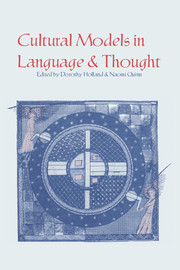Book contents
- Frontmatter
- Contents
- Preface
- List of Contributors
- Introduction
- Part I Presupposed worlds, language, and discourse
- Part II Reasoning and problem solving from presupposed worlds
- Part III The role of metaphor and analogy in representing knowledge of presupposed worlds
- Part IV Negotiating social and psychological realities
- 11 Myth and experience in the Trobriand Islands
- 12 Goals, events, and understanding in Ifaluk emotion theory
- 13 Ecuadorian illness stories
- 14 Explanatory systems in oral life stories
- Part V An appraisal
- Index
13 - Ecuadorian illness stories
Cultural knowledge in natural discourse
Published online by Cambridge University Press: 05 June 2012
- Frontmatter
- Contents
- Preface
- List of Contributors
- Introduction
- Part I Presupposed worlds, language, and discourse
- Part II Reasoning and problem solving from presupposed worlds
- Part III The role of metaphor and analogy in representing knowledge of presupposed worlds
- Part IV Negotiating social and psychological realities
- 11 Myth and experience in the Trobriand Islands
- 12 Goals, events, and understanding in Ifaluk emotion theory
- 13 Ecuadorian illness stories
- 14 Explanatory systems in oral life stories
- Part V An appraisal
- Index
Summary
The theme of illness occurs frequently in conversation the world over. Illness stories, set apart from the conversational flow by certain structural features, encode cultural models of causation, extensive situation knowledge (Holland 1985) about appropriate behavior when someone is sick, and a vast amount of cultural knowledge about types of treatments and health specialists. Because the tasks of coping with illness fall heavily on family members and friends of an afflicted individual, there is a general need for access to cultural knowledge about ways to respond to different illnesses. Through hearing illness stories, individuals expand the cultural models they use to think about and interpret illness.
During the course of conversation in the highland city of Quito, Ecuadorians often tell one another about health problems that they or others have suffered. Many different cultural models can be discerned in this discourse, but it is situation knowledge of social roles that is most dramatically and exhaustively encoded. Ecuadorian illness stories often transcend their topical focus and express general models of the family, of neighbor and friend relationships, and of social hierarchy in Ecuadorian society. Before discussing these models, this paper briefly summarizes the ethnographic context of illness story-telling and the structure of illness stories.
Ethnographic context
This analysis is based on one year's field research in a marginal, largely Mestizo neighborhood of Quito, Ecuador. Residents of the barrio, here called Las Gradas, tell numerous stories that can be broadly labeled misfortune tales.
- Type
- Chapter
- Information
- Cultural Models in Language and Thought , pp. 313 - 342Publisher: Cambridge University PressPrint publication year: 1987
- 39
- Cited by



